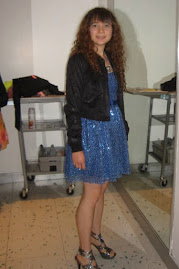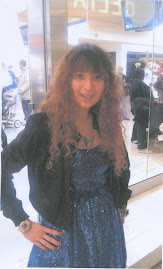Marisa has a very active social life, but most of her activities are planned with her friends, all of which are either on the autism spectrum or have other developmental disabilities. But this past Sunday, Marisa had a special opportunity to spend some time with neurotypical peers. A very receptive professor at Keuka College who is using my book to help her special education students learn about life for families living with autism and other disabilities, apparently got some of her students interested enough to take this one step further. For the past couple of years, the professor has been sending me letters written by her students to let me know what they have learned from my book. Her hope is that her students will gain more from expressing what they learned from me, the author, than simply writing a class paper on the subject of autism.
I have found this to be very rewarding because, these college students are able to gain insight from the years I have spent raising a child with autism. Whether they become special education teachers or not, is irrelevant. What is important is that these young adults are gaining an appreciation and a new perspective on what life is like living with a family member having a disability. They are learning by reading a first-person experience, rather than just getting the basics from a textbook approach.
When I first published my book, Isabelle Rapin, a well known neurologist, very knowledgeable about autism, wrote a wonderful review of Finding Marisa in The Journal for Autism and Developmental Disorders (2007) 37:2024-2025 issue.
She said, "I hope the professionals who take the time to read the book will recommend it widely to the parents of the children they care for because I believe it will be useful to parents and professionals alike."
I have helped Marisa, my daughter with autism, grow to be the best person she can be, while at the same time being happy with who she is. To me this is a most valuable accomplishment because, when one truly believes in oneself, there is a better chance that others will believe in them too. That being the case, I trust that with good supports in place, Marisa will be successful at whatever she chooses to do.
So when I received an e-mail from a student attending Keuka College, whose home is relatively close to ours, I was absolutely stunned! She and another student were requesting to come and meet Marisa. Marisa was so excited that she set out immediately planning the day. There would be an opportunity to share and play her Wii games, share the DVD copies of the shows she had main roles in (The Little Mermaid and Mary Poppins), prepare a dessert and perhaps play Uno and Scrabble, both favorites of hers. She also shared some picture albums and some of her favorite Facebook games. It was a magical day for Marisa! I have to say it had to have been the very first time she actually had two neurotypical girls over for a fun afternoon.
Was this a valuable experience for the students, Briana and Alex, both Sophomores at Keuka College, who spent a good 4 hours with Marisa? I think it was. Although Marisa was able to take charge of numerous games, prepare and serve a dessert and share her picture albums, there is still one very important fact that clearly set her apart. Marisa's autism made it difficult for her to hold an extended conversation. The give and take and natural flow of ideas expressed openly to another, is one area that poses a great challenge to someone with autism, and though there are many things Marisa is able to do well, this is not one of them.
For Briana and Alex, who were happy to have the opportunity to share an afternoon with Marisa, there had to be an appreciation of what was truly present, and a growing awareness of what was clearly absent in her ability to openly converse. Just as there are challenges for someone who is blind or deaf, there are also immense challenges for those with autism. Clearly, the biggest challenge is the ability to process language and participate in the joys and ease of interactive conversation. One must appreciate that the ability to express one's thoughts and feelings, can lead to frustration and outbursts for those on the spectrum who are more severely impaired in language.
Was this a good experience for the students who took the time to visit? I believe it was, and not just for them. This was a hands-on experience at it's best ... for me, because I experienced the joy Marisa felt for having the opportunity to share her life with neurotypical peers; for Marisa ... for having the chance to do so; and for Briana and Alex ... who cared enough to take the time to reach out and connect with someone living with autism, a condition that still remains a puzzle to most of the neurotypical population. However, if more young people attempt to reach out and understand and accept those with autism, then there is hope for a better future, not just for the next generation of those on the spectrum, but for the rest of us who will be able to gain from the many talents this special group of people have to offer.
I have found this to be very rewarding because, these college students are able to gain insight from the years I have spent raising a child with autism. Whether they become special education teachers or not, is irrelevant. What is important is that these young adults are gaining an appreciation and a new perspective on what life is like living with a family member having a disability. They are learning by reading a first-person experience, rather than just getting the basics from a textbook approach.
When I first published my book, Isabelle Rapin, a well known neurologist, very knowledgeable about autism, wrote a wonderful review of Finding Marisa in The Journal for Autism and Developmental Disorders (2007) 37:2024-2025 issue.
She said, "I hope the professionals who take the time to read the book will recommend it widely to the parents of the children they care for because I believe it will be useful to parents and professionals alike."
I have helped Marisa, my daughter with autism, grow to be the best person she can be, while at the same time being happy with who she is. To me this is a most valuable accomplishment because, when one truly believes in oneself, there is a better chance that others will believe in them too. That being the case, I trust that with good supports in place, Marisa will be successful at whatever she chooses to do.
So when I received an e-mail from a student attending Keuka College, whose home is relatively close to ours, I was absolutely stunned! She and another student were requesting to come and meet Marisa. Marisa was so excited that she set out immediately planning the day. There would be an opportunity to share and play her Wii games, share the DVD copies of the shows she had main roles in (The Little Mermaid and Mary Poppins), prepare a dessert and perhaps play Uno and Scrabble, both favorites of hers. She also shared some picture albums and some of her favorite Facebook games. It was a magical day for Marisa! I have to say it had to have been the very first time she actually had two neurotypical girls over for a fun afternoon.
Was this a valuable experience for the students, Briana and Alex, both Sophomores at Keuka College, who spent a good 4 hours with Marisa? I think it was. Although Marisa was able to take charge of numerous games, prepare and serve a dessert and share her picture albums, there is still one very important fact that clearly set her apart. Marisa's autism made it difficult for her to hold an extended conversation. The give and take and natural flow of ideas expressed openly to another, is one area that poses a great challenge to someone with autism, and though there are many things Marisa is able to do well, this is not one of them.
For Briana and Alex, who were happy to have the opportunity to share an afternoon with Marisa, there had to be an appreciation of what was truly present, and a growing awareness of what was clearly absent in her ability to openly converse. Just as there are challenges for someone who is blind or deaf, there are also immense challenges for those with autism. Clearly, the biggest challenge is the ability to process language and participate in the joys and ease of interactive conversation. One must appreciate that the ability to express one's thoughts and feelings, can lead to frustration and outbursts for those on the spectrum who are more severely impaired in language.
Was this a good experience for the students who took the time to visit? I believe it was, and not just for them. This was a hands-on experience at it's best ... for me, because I experienced the joy Marisa felt for having the opportunity to share her life with neurotypical peers; for Marisa ... for having the chance to do so; and for Briana and Alex ... who cared enough to take the time to reach out and connect with someone living with autism, a condition that still remains a puzzle to most of the neurotypical population. However, if more young people attempt to reach out and understand and accept those with autism, then there is hope for a better future, not just for the next generation of those on the spectrum, but for the rest of us who will be able to gain from the many talents this special group of people have to offer.








